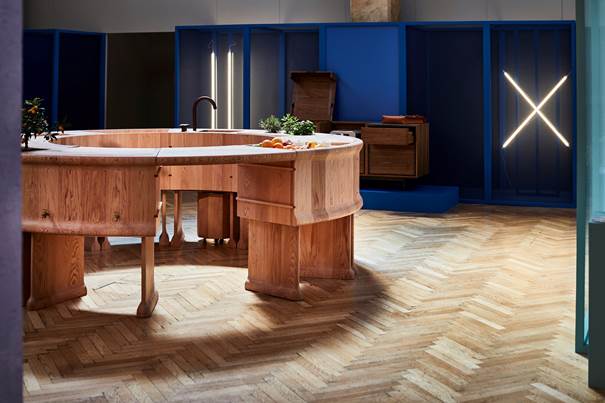
The art of making Red Oak more Red
American Red Oak is a dominant species in the eastern U.S. hardwood forests. Despite its name – which comes from the color of its leaves in the fall – its sapwood is white to light brown and its heartwood is a pinkish-reddish brown. Its grain is distinctive. It machines well. It’s hard and heavy, and an excellent species choice for creative designs like ‘Blushing Bar.’
A collaborative effort of architects Chan + Eayrs, craftsman Sebastian Cox, and the American Hardwood Export Council (AHEC), David Venables, European Director of AHEC, says he was initially nervous about the idea of ‘making red oak more red’, but was won over by the creativity and the beauty of the effect.
Uniquely pink and curiously inviting, ‘Blushing Bar:’
- Is composed of 10 curved modules – designed for water, alcohol, sodas, fruit, herbs, ice, glasses, holders, cutting, wash basin – that connect to form a circular bar.
- Was designed by Chan + Eayrs, a husband and wife team that gets personally involved in each project, and a duo that likes to “feel” their work. “Love makes one blush,” says Merlin Eayrs, “and the heart pound; increasing blood circulation through the body through our veins." Thus the name and color of the bar.
- Was built by Sebastian Cox, a furniture designer, maker and environmentalist based in south London “who is deeply motivated by the way generations of craftsmen have used a limited palette of biodegradable and renewal materials, extracted from the land in a responsible and connected way.
- “To dye the wood, Cox and his team machined a series of uniform holes into the end grain of the red oak; put the wood into a purpose-made dying jig; filled the holes with red calligraphy ink; and used pressured air to force the ink into the uniquely ring porous structure of the red oak.”
From the Craftsman
“The properties of wood are traditionally thought of in relation to its strength, hardness and weight, but when you start looking at the cellular structure of wood, you can begin to explore other properties. Red oak is uniquely ring porous, so this project has been a really fun exploration of its cellular composition, and how we can use it to achieve a new aesthetic.”
To learn more about this unique project, visit www.americanhardwood.org .
 Photo courtesy: Giovanni Nardi Photography
Photo courtesy: Giovanni Nardi Photography
